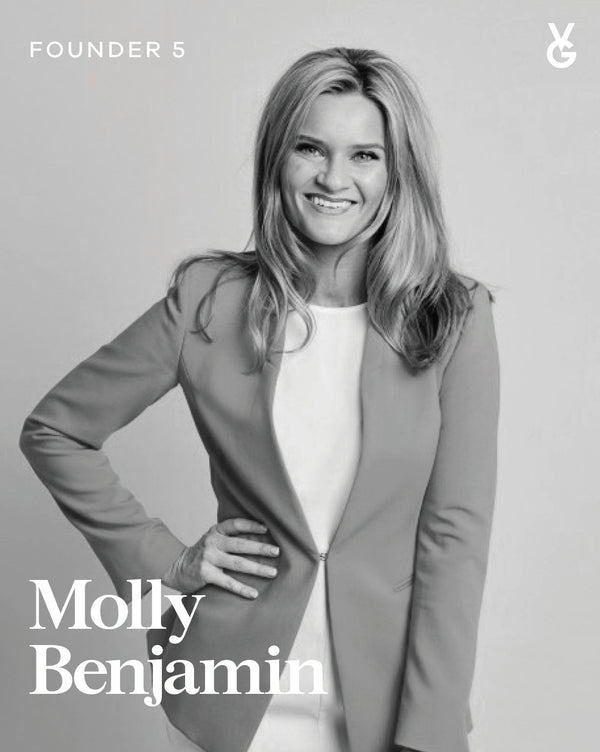5 steps to improve your financial wellness

5 steps to improve your financial wellness
Wellness is a concept that holds influence over many aspects of our lives. We focus on our waistline and how we can improve our skin but often forget about the one thing that makes the world go round: money.
Molly Benjamin is the founder of Ladies Finance Club, a platform created to help women take control of their financial future (minus the boring bits). She’s hosted countless workshops, online courses, and worked with more than 35,000 women to change the way they think and behave with money.
Here, Molly shares her practical tips and expert advice to help you, no matter your financial situation, begin implementing changes that alleviate stress, uncertainty or fear surrounding money.
What is financial wellness?
Unlike financial wealth that’s all about having money in the bank, financial wellness is about how your approach to managing your finances impacts your life. And in Molly’s opinion, it’s something we should be paying more attention to.
“We prioritise our physical and mental wellness, yet frequently neglect our financial wellness even though it plays a huge role in our life and our all over wellbeing. If you have control over your money, you have control over your life,” shares Molly.
Improving your financial wellness is about practicing better money habits, setting goals, and taking steps to achieve them—all with the aim of improving your overall quality of life.
The importance of your money mindset
“Our money mindset—our thoughts, feelings, and beliefs about money—determines how much we make and keep in our lives. It’s crucial and often formed by the time we are 7 years old, heavily influenced by how our parents’ managed money,” advises Molly.
“A significant part of changing your money beliefs includes forgiving yourself for past financial mistakes—understanding that you were doing the best you could with the knowledge you had at the time. Mantras and reframing are powerful tools for altering your beliefs about money. The brain is incredibly adaptable and will believe what you tell it. So, if you affirm, ‘I'm getting better with money every day,’ you'll start taking actions that align with this belief.”


In addition to adjusting your mindset, Molly also recommends practical tips to help you navigate your finances and put good habits in place that set you up for long term success.
Five steps to improve your financial wellness
1. Build your OMG fund
Aim for 3-6 months' worth of expenses. This is your safety net for true OMG moments only. Not ‘OMG, flights to Bali’ but ‘OMG, my car needs new tires’ or ‘OMG, I need to take a month off work’. Keep it in a separate bank account with high interest and no fees. Make sure it’s in your own name, start with $1000 and continue to build it up.
2. Ask yourself; ‘What do you want?’
Successful people all have something in common, they reach their goals because they know where they're headed. So, list the next three things you want to achieve with your money. For example, saving a property deposit, share investing or paying off credit cards. Specify a dollar amount, and deadline, and add details. Not just ‘I want to save more money’, but "’ want to save $5,000 for an overseas holiday to France in August 2025.’
3. Set up your bank accounts for success
Not keen on spreadsheets? Totally understandable! Tracking every coffee purchase isn't for everyone. In my book, Girls Just Wanna Have Funds, I cover two main budgeting methods: Zero-Based Budgeting and the 50/30/20 Rule. The 50/30/20 Rule simplifies things; create three accounts, give them fun names (because a ‘Treat Yo Self Account’ sounds more exciting than ‘Account: 407652’), and allocate your pay check accordingly.
For a $5,000 monthly income, it breaks down as:
- $2,500 (50%) to your "Financially Adulting" account for essentials like rent, bills, and groceries.
- $1,500 (30%) to your "Fun Money" or "Treat Yo Self" account for enjoying life.
- $1,000 (20%) to your "Future Me" account for investments, saving for property, or boosting your superannuation.
This approach lets you manage your money without micromanaging every penny, promoting a balanced financial lifestyle. You can of course change the % and have different accounts for different goals. It’s your money so find a system that works for you.
4. Negotiate your bills
Aim to do this once a year. Pick up the phone and call your service providers - trust me you’ll save!
5. Start investing and growing your money
If you're new to investing, microinvesting is an excellent place to start. It's like saving your spare change, but instead of a piggy bank, you invest it. Each purchase you make contributes a small amount to your investment account. Over time, these contributions can grow significantly, thanks to being invested in stocks or funds. It's a straightforward and accessible way to begin investing with minimal upfront money.
Whether you’re just beginning your money journey or have a few moves under your belt, there’s never a bad time to realign your priorities and refocus on your financial wellbeing. Simple mindset shifts will have a big impact, and being clear with goals is the place to start. And don’t be afraid to engage with your own community and start conversations about money. Like health or beauty goals, sharing them with a friend is a quick way to maintain accountability and make the process more enjoyable.

